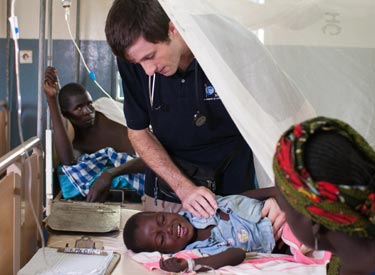 Interested in a career in medicine? You’re in luck – according to a recent news release by the Association of American Medical Colleges (AAMC), U.S. medical schools are on track to increase enrollment 30 percent from 2002 to 2017, a goal that AAMC had called for in 2006 in order to meet the medical demands of aging baby-boomers. AAMC has projected that there will be a shortage of 90,000 primary care and specialty doctors in the U.S. by 2020.
The news was not all positive, however, as federal funding for residency positions has remained stagnant. According to AAMC President and CEO Darrell Kirch, this is a problem because students studying medicine are required to complete these training programs in order to become practicing physicians. Congress’s failure to increase funding for residency programs has caused the enrollment increases at medical schools to have only limited effectiveness at increasing the number of practicing physicians.
Interested in a career in medicine? You’re in luck – according to a recent news release by the Association of American Medical Colleges (AAMC), U.S. medical schools are on track to increase enrollment 30 percent from 2002 to 2017, a goal that AAMC had called for in 2006 in order to meet the medical demands of aging baby-boomers. AAMC has projected that there will be a shortage of 90,000 primary care and specialty doctors in the U.S. by 2020.
The news was not all positive, however, as federal funding for residency positions has remained stagnant. According to AAMC President and CEO Darrell Kirch, this is a problem because students studying medicine are required to complete these training programs in order to become practicing physicians. Congress’s failure to increase funding for residency programs has caused the enrollment increases at medical schools to have only limited effectiveness at increasing the number of practicing physicians.
Given the highly competitive nature of medical school admissions, how can you best prepare yourself for acceptance? Check out these trends in medical school admissions for some helpful hints:
1. Medical schools are implementing holistic review
While medical schools traditionally relied on GPA and MCAT scores to evaluate applicants, new research that found MCAT scores highly correlated to test takers’ race, gender and socioeconomic background has caused schools to re-think the way they review applications. Groups like the AAMC have promoted holistic review processes where applicants’ intellectual achievement, employment experience, personal background, community service and leadership qualities, among other intangibles, are evaluated as well. According to a recent article published in the New England Journal of Medicine, Boston University School of Medicine, an early proponent of holistic review, saw its 2012 entering class GPA and MCAT scores rise to 3.66 and 33.62 from 3.57 and 31.68, while students underrepresented in medicine rose to 20% from 12%.
Take away: Get involved in community programs and volunteer groups that match with your interests, especially if they are relevant to your future career in medicine. Think about attending events run by Globemed, a student group that addresses global health inequity, becoming involved in Dartmouth's Emergency Medical Services, or volunteering at events run by the Dartmouth-Hitchcock Medical School in order to round out your classroom interests with relevant extracurricular programs.
2. “Early assurance” programs are expanding
Schools like Dartmouth, Georgetown, Northwestern and Tufts, offer undergraduate students a chance to apply to their affiliated medical schools as rising juniors. The goal of such programs is to allow students a chance to broaden the scope of their college academic pursuits and avoid the substantial time and energy investment students usually make studying for the MCAT exam. Dartmouth began offering an early assurance program to Geisel in 2012-2013 and extended admission to five members of the class of 2014 through the program.
Take away: If you are sure you want to pursue a career in medicine, check out Dartmouth and other programs that offer early assurance admission as a way to reduce stress during your senior year and avoid preparation for the MCAT exam.
3. More students are taking time off before medical school
80 percent of Dartmouth students take at least one year off before attending medical school, a percentage that pre-health advisor Sarah Berger said she expects to see grow in coming years. Some students pursue academic programs to help round out their medical school applications or gain further research and lab experience, while others take time off to pursue opportunities unrelated to medicine, Berger said.
Take away: If you know you want to attend medical school, think about whether it would be helpful to take a year or more off. This time might contribute to stronger professional skills that you can list on your application, or it might help you narrow the focus of your medical studies.
Looking for further advice about pre-health academic advising? Visit Berger at the student advising offices located on the first floor of Baker-Berry library or her colleague, Lee Witters, at his office in the Life Sciences Center. Career services can help you to navigate your search for off-term or post-graduate internships and fellowships related to health, but see Berger and Witters for specific MCAT test preparation practice or pre-health academic planning.




